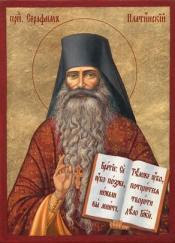Joypeacehope fading - Light of day waning - Dark of night waxing - Saddened heart weary - Brightened eyes dimming - God have mercy
Monday, November 30, 2009
The Holy Work Of Acquiring Love
Friday, November 27, 2009
The Wrath Of God Perfectly Explained

The wrath of God is the painful sensation we experience when we are being trained by Him. Through this painful experience of unsought sufferings God often abases and humbles an intellect conceited about its knowledge and virtue; for such sufferings make it conscious of itself and its own weakness.
(The Philokalia)
Thursday, November 26, 2009
Another Amazing Saint, Another Amazing Story

...But his enemies were not to be appeased. From the capital came orders to transfer Saint John to desolate Pitius (in Abkhazia). Worn out by sickness, under accompanying military escort for three months in the rain and frost, the saint made his final transferral, – at Comana his powers failed him. At the crypt of Saint Basiliskos comforted by a vision of the martyr ("Despair not, brother John! Tomorrow we shalt be together"), and having communed the Holy Mysteries, the oecumenical hierarch with the words, "Glory to God for everything!", expired to the Lord on 14 September 407...(click on the title for the rest of the story).
Wednesday, November 25, 2009
The Mystery Of Lawlessness
Tuesday, November 17, 2009
The Monk Ioannikes the Great

...The Monk Ioannikes spent 70 years in ascetic deeds and attained to an high spiritual perfection. Through the mercy of God the saint acquired the gift of prophecy, as his student Pakhomios has related. The monastic elder during the time of prayer hovered over the ground. One time he traversed a river flooded to overflowing. The saint could make himself invisible for people and make others invisible: one time the Monk Ioannikes led out from prison Greek captives under the watch of a crowd of guards. Poison and fire, with which the envious wanted to destroy the saint, did him no harm, and predatory beasts did not touch him. It is known, that he freed the island of Thasos from a multitude of snakes. The Monk Ioannikes likewise saved a young nun, who was preparing to quit the monastery on a whim to marry; he took upon himself the agonised maiden's suffering of passion, and by fasting and prayer annihilated the seductive assault of the devil.
Foreseeing his end, Saint Ioannikes expired to the Lord on 4 November 846, at the age of 94.
Monday, November 16, 2009
Basic Christianity 101
Wednesday, November 4, 2009
The Apostle James - Brother of Christ


